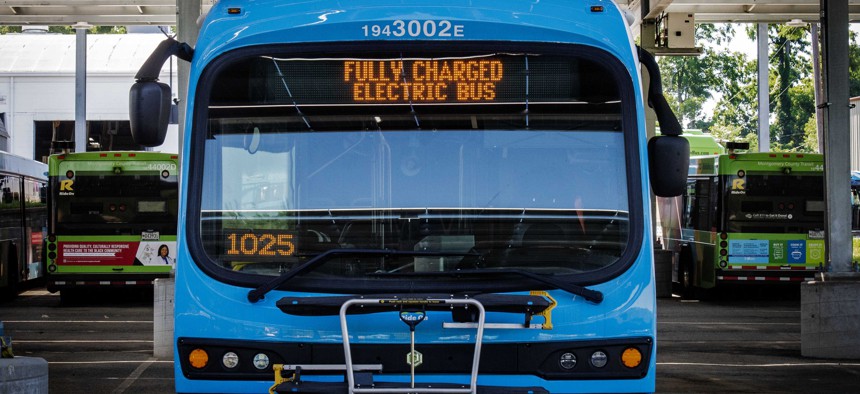Feds Award $1.6B to Speed Transition to Electric and Hydrogen Buses

A new electric bus sits across from a row of fossil fuel versions resting in the shade of solar panels as Montgomery County nears completion on construction on its micro-grid enabled electric bus terminal, in Silver Spring, Maryland. Bill O'Leary/The Washington Post via Getty Images
The money will go to 150 transit agencies around the country to help them upgrade their fleets and facilities.
The number of electric buses and other zero-emission vehicles used by transit agencies will nearly double, the Biden administration said, as the Federal Transit Administration announced Tuesday that 150 agencies will get federal grants to help them move away from fossil fuels.
“This is a huge win for communities of every size and makeup across America without leaving anyone behind, including in rural areas,” said Mitch Landrieu, the White House’s infrastructure coordinator, during a press event. “It will also take another pivotal step towards the president’s goal of a net-zero emissions America by 2050. The bipartisan infrastructure law’s role in this progress cannot be understated.”
The $1.6 billion in grants unveiled Tuesday were authorized by the Infrastructure Investment and Jobs Act, which President Biden signed last year. With the new money from that law, the grants the FTA gave out for zero- and low-emission vehicles this year was six times more than it did last year.
U.S. transit agencies use 1,300 zero-emission buses, said Nuria Fernandez, the FTA administrator. The grants distributed for this year will pay for 1,100 more, she said. The federal grants will also pay for an additional 700 low-emission buses that use natural gas or diesel-hybrid power.
“This is the type of [progress] that will bring the momentum that is needed so that we can move forward with the transition of the American bus fleet of nearly 60,000 buses into a clean-emitting bus fleet,” Fernandez said. “After all, buses are the workhorse of our transit industry.”
Buses made up 51% of transit passenger trips in the first quarter of 2022, according to the American Public Transportation Association.
Transit agencies must spend their funds by September 2025, but the FTA chose recipients, in part, because of how quickly it thought the transit agencies could use the money to make improvements.
The grants come as the Biden administration is touting the benefits of electric vehicles. Support for electric vehicles is a key component of the Inflation Reduction Act, a far-reaching spending bill that Biden plans to sign Tuesday. That law could disrupt the electric vehicle market, though, as its subsidies are directed at lower-cost models for which key components are made in the United States. Many models would not qualify.
But FTA officials said they did not encounter any problems with similar provisions that apply to buses and trains, which have been in place for decades but were increased in the infrastructure law. Manufacturers of minivans and smaller vehicles have also assured FTA officials that they could switch from diesel vehicles to battery electric or fuel-cell vehicles.
Big Wins for Big Cities
Transit systems in the Boston and New York areas received the biggest grants awarded Tuesday, with each receiving $116 million. The Massachusetts Bay Transportation Authority plans to buy as many as 85 battery-electric buses, and to start a related training and safety program. The New York Metropolitan Transportation Authority will buy 230 battery electric buses, about 4% of its current fleet. (The MTA is able to buy more vehicles than the Boston-area agency, because it “significantly exceeded” the share of local funding required by law to qualify for the grants, making its funding go further.)
Both agencies will use their new vehicles to replace diesel buses.
With $104 million, the Los Angeles County Metropolitan Transportation Authority took in the third-highest grant amount. It will buy 160 electric buses and charging equipment. The battery-operated vehicles will replace buses running on compressed natural gas.
While most of the money would help purchase or support electric vehicles, several agencies also received money to buy vehicles run on hydrogen fuel cells, too. Phoenix, for example, plans to buy up to 12 hydrogen-powered buses and six battery-electric buses. Transit agencies in Alabama, California, Delaware, Maryland, Michigan, New York and Ohio are pursuing hydrogen vehicles as well.
The FTA said demand for the federal grants far surpassed the amount of money available. The agency received 530 project proposals, with a total of $7.72 billion in requests for the $1.66 billion available. But Hernandez said applications to buy low-emission vehicles were lower than anticipated, and $60 million remained for that program.
The infrastructure law authorizes the grants for bus and facility upgrades for another four years after the current round.
Daniel C. Vock is a senior reporter for Route Fifty based in Washington, D.C.
NEXT STORY: America's Crumbling Municipal Pools






